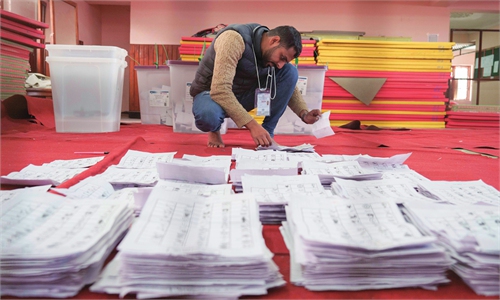
Illustration: Tang Tengfei/Global Times
Pushpa Kamal Dahal "Prachanda" was sworn in as the Prime Minister of Nepal at a ceremony on Monday in Kathmandu. Western media has reported on the inauguration, paying special attention to the new government's future policy, especially toward its immediate neighbors - China and India. Citing officials from the ruling coalition, Reuters reported on Monday that the new government will try to balance ties with its neighbors China and India in pursuit of economic growth.Although some Western media outlets deliberately hyped up the so-called China-India competition, saying "Nepal is one of several South Asian countries where India and China both seek influence," Nepalese officials have placed a priority on the pursuit of economic growth. This, to a certain degree, reflects the strategic sobriety and rationality of the new Nepalese government in the face of geopolitical tricks played by some in India and the West.
Chinese Foreign Ministry spokesperson Mao Ning said on Monday that as Nepal's traditional friend and neighbor, China deeply values its relations with Nepal. "We stand ready to work with the new Nepalese government to expand and deepen friendly exchange and cooperation across the board," Mao noted.
China and Nepal have continued to strengthen cooperation, making progress particularly in areas including vaccines, infrastructure building, investment and trade. Bilateral trade between China and Nepal grew by 56.4 percent year-on-year in 2021 despite the raging COVID-19 pandemic, which proves that economic relations enjoy deep foundations, strong resilience and huge potential.
Since Nepal and China signed a bilateral cooperation agreement under the Belt and Road Initiative (BRI) in 2017, the two countries have deepened cooperation based on mutual trust and mutual benefits. For instance, China in August this year reiterated a plan to support the feasibility study for a cross-border railway linking China and the South Asian nation, injecting optimism into enhanced connectivity that will give a big economic boost to the landlocked Himalayan country. If a rail connection between Southwest China's Xizang Autonomous Region and Nepal's capital of Kathmandu can be achieved, the two countries can establish an integrated network of rail freight.
It must be pointed out that China's economic cooperation with Nepal does not target any third party, including India. In the era of global interdependence, no bilateral relationship should be exclusive. Economic and social development is the core interest of all countries, and it is understandable that Nepal wants to focus on economic growth.
India is Nepal's largest trading partner as well as an important source of inbound investment. It's natural that Nepal develops its relations with India. India and Nepal have undertaken various connectivity programs to enhance people-to-people linkages and promote economic growth and development. In recent years, India has also showed great interest in investment in cross-border roads, railways and oil pipelines extending to Nepal. However, India's cooperation with Nepal should also not target cooperation between Nepal and other countries like China. In fact, there is great room for trilateral cooperation among the three countries.
It is noteworthy that China and India are seeking to strengthen infrastructure linkages with Nepal from different directions, and the Himalayan nation is the midpoint of infrastructure efforts by the two emerging giants in Asia. The Himalayan nation needs a big push in infrastructure investments to stimulate economic growth, while both China and India hope to bolster regional connectivity. If a cross-Himalayan economic corridor connecting the three economies can become a reality, it will benefit the regional economy as a whole.
However, there are challenges ahead. Although China develops ties with India's neighboring countries out of goodwill and delivers win-win results and mutual benefits, some in India and the West see these economic relations through a geopolitical lens. Certainly, there is competition between China and India in some aspects, and some focus primarily on this in attempt to instigate tension between the two countries. However, focusing on economic cooperation is the best way forward for regional countries like India and Nepal.
The author is a reporter with the Global Times. bizopinion@globaltimes.com.cn



